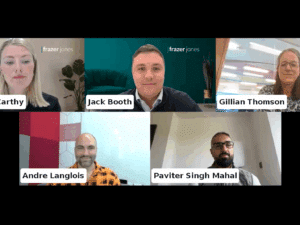What makes a great reward professional in 2025?

In 2025, the role of reward professionals in the Netherlands has evolved far beyond just compensation management.
Today’s top talent in reward is expected to be strategic, data-driven and deeply attuned to employee needs and preferences.
As organisations strive to improve retention, boost employee engagement and create a culture of appreciation and pay-for-performance, the demand for high-performing reward professionals is high.
So what makes a great reward professional in 2025?
A strategic architect of total rewards
A great reward professional understands that a one-size-fits-all approach is no longer the standard. They craft a total rewards strategy that:
- Aligns with company goals
- Is transparent and proactively communicated
- Offers flexibility and personalisation
- Supports employee well-being
- Is grounded in merit and driven by data
- Goes beyond financial compensation, including financial rewards, employee benefits, perks, recognition programs and wellness programs and more – all tailored to diverse workforces and evolving employee preferences
In the Netherlands, top priorities include work-life balance and flexible work, fair compensation, personalised benefits, growth and purpose and transparency – so reward professionals must create packages that go beyond salary. They integrate paid time off, hybrid work options, healthcare and development opportunities into a cohesive reward system that enhances the employee experience.
Data-driven and tech-savvy
With the rise of data-driven HR, automation and artificial intelligence, reward professionals must be comfortable with technology. They use real-time data and metrics to track employee performance, job satisfaction and turnover rates, as well as standardising pay transparency in preparation for the European Pay Transparency directive. Tools like pulse surveys and skills benchmarking, predictive tools and HR analytics platforms help them optimise strategies and respond quickly to changing needs.
Professionals must be able to leverage data to assess the effectiveness of compensation and benefits programs – including rewards, recognition and wellbeing initiatives. Ata fluency is essential for making informed, strategic decisions – whether it’s analysing employee engagement scores, tracking participation in flexible benefits or evaluating the ROI of incentives like profit-sharing, stock options or wellness stipends.
Champions of employee engagement and wellbeing
Reward professionals are now central to driving employee engagement and retention. They collaborate with HR and leadership to develop initiatives that support employee wellbeing, including mental health resources, team-building activities and peer-to-peer recognition schemes.
In the Netherlands, workplace culture is increasingly focused on wellness, work environment and career development, so reward professionals must be proactive. They create programs that celebrate milestones, encourage skills development and offer clear paths for career growth and career advancement.
Personalised and inclusive approach
Professionals must understand employee needs. Great reward professionals listen, adapt and personalise. They know that what motivates one team member may not resonate with another. Some may value financial wellbeing while others may prioritise professional development or flexible work arrangements.
By using tools like social media and internal platforms to gather feedback, they ensure that employee recognition and employee rewards are meaningful and inclusive. This builds trust and strengthens workplace culture, making employees feel valued and heard.
Collaborative and communicative
Reward professionals must be excellent communicators. They work across departments – HR, finance, leadership – to ensure alignment and transparency. They explain complex reward structures clearly, manage expectations and gain buy-in for new initiatives.
The ability to build rapport quickly and deliver impact is especially important in interim roles. Whether launching a new rewards strategy or refining existing recognition programs, collaboration is key to success.
Future-focused and adaptable
The best reward professionals are always looking ahead. They stay informed about trends in employee satisfaction, skills-based compensation, transparency, analytics and workplace culture. They anticipate shifts in the market and adapt strategies to remain competitive.
In 2025, this means embracing automation, leveraging artificial intelligence and streamlining processes to improve efficiency. It also means being ready to pivot – whether responding to economic uncertainty, evolving legislation or changing workforce expectations.
A great reward professional in 2025 is more than a compensation expert – they’re a strategic partner, a data analyst, a wellness advocate and a culture builder.
If you’re a reward professional looking to take the next step in your career, our team at Frazer Jones specialises in connecting candidates with permanent and interim opportunities across the Netherlands.
Get in touch today to discuss your career goals and explore our latest roles here and on LinkedIn.



